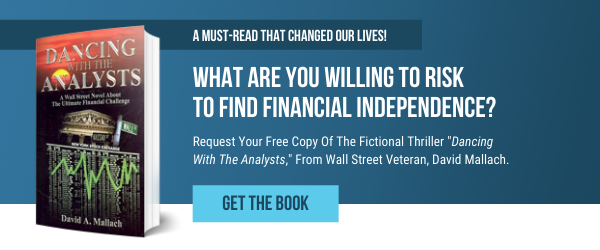I thought I’d start out with a couple of definitions. I know these are common words, but it’s important to capture this so that we’re all on the same page. The first word: overwhelming, by which I mean a very great amount. The second word: fact, something that is known and proven to be true. Then, we have immutable, one of my favorite words: something unchanging over time or unable to be changed.
I was reading some articles, by the talking heads out there, many of whom are prognosticating that the market is wildly overvalued. One commentator, a former Head of Equity and Derivative Strategy at Cantor Fitzgerald, Peter Cecchini, remarks that the market is wildly overvalued as of right before Christmas 2020, and that investors who buy into those market conditions need to close out their positions very, very soon. Then there’s this other article published back in March 2020, in which the very notable “expert,” Mohamed El-Erian, who I believe was at one point the CIO of the Harvard endowment, and also at another point the CIO of CalPERS, the California Public Employees' Retirement System. In March 2020, he went on record saying that you should not buy into this dip if you’re a long-term investor. And then a few weeks after that, he said that it may not be a good time to get back in.
You could do a Google search right now and find countless articles by any number of talking heads predicting what will happen in the future. From a long-term investor’s perspective, this is all garbage. How does a long-term investor derive any kind of meaning from a comment such as the one El-Erian made? But people buy into this kind of nonsense. They believe in it because they put credence into the person’s credentials. “Well, he was the former investment officer at the Harvard endowment,” they may say to themselves. “He ran CalPERS for a while, that’s got to count for something,” they may add. When somebody is famous, I think folks are quick to give them the benefit of the doubt. As if their celebrity means something.
When it comes to your money, attaching weight to someone else’s opinion is terribly irresponsible. Time invariably proves that this person, with all his/her credentials and impressive resume, had no idea what they were talking about. This is just a reminder that maybe all of us as investors should count on ourselves and our own good sense a bit more than we actually do.
Analyses are published on a regular basis these days signaling that the market's overvalued. Maybe the market is overvalued, right now, who knows? I certainly don't know what's going to happen tomorrow. If you're a long-term investor, what the hell does that mean anyway, and why the hell does it even matter? What kind of impact does it have on your long-term view if GameStop or AMC - or any one of these other stocks that have been in the news recently – is up or down? As we have discussed here again and again, the long-term market average of the S&P 500, if we're going to use that as a benchmark for the sake of this conversation, is about 10% a year before inflation. If you're going to accept that fact as a long-term investor, who cares about GameStop? Or what the heck do you care about El-Erian, or Warren Buffett, or anybody else?
As advisors, we really need to be above all this noise. It’s possible that valuations may be higher than normal, but then again, maybe they're not. Maybe the market has already discounted the effects of the pandemic, maybe it hasn't. If you have ten or more years of time horizon this should be a non-issue for you. And by the way, even if you were to retire tomorrow, that doesn't mean your time horizon is one day... if you or your spouse are around 60-65, at least one of you is going to live into your nineties, statistically speaking. Today’s retiree has, statistically speaking, a time horizon of about 30 years.
As advisors, we hear the term “valuation” a lot, just like we hear “risk” and “volatility.” Valuation has never, ever been a reliable market timing tool. Neither is anything else. If valuations are higher than normal, the market will correct, it always does. Every six years, we see a big bear market that lasts on average 14 months but within those six years, we see multiple corrections. These things happen all the time.
We tend to point to '08 and '09 as the ‘be all, end all’ for corrections. But since 2009, I think there have been eight market movements of greater than a 10% decline. I think that the average intra-year correction was like 14 or 15%. During that period, even if the market finished in positive territory in a given year, it still had a correction north of 10% in almost every one of the years leading up to it.
When somebody says something is overvalued, a rational person may infer that they need to do something (as if they could do anything about it!). But then you look a little bit beneath the surface, and you see, oh, well the market kind of corrects itself all the time. We have these corrections defined as 10% every six years, as we said, with one of those corrections being greater than 20%. If the rational person makes the effort to look just a little bit beneath the surface, perhaps the conclusion they would come to is, “I should do is nothing.” You can't time the market. Nobody can predict whether it's overvalued or undervalued.
Hopefully, the rational person would then think, “Well, the best thing I can do is just stay put and focused on executing the plan that I put in place. (Hopefully, I've got a plan in place!)” Peter Lynch, the legendary Fidelity Portfolio Manager is quoted as saying, "Far more money has been lost by investors preparing for corrections or trying to anticipate corrections than has been lost in the corrections themselves" I just love that line. I love it. There is an overwhelming benefit to staying invested, there’s a benefit to ignoring the noise.
And I don't blame investors for falling for celebrities. People do it all the time – from being superfans of a certain investment ‘guru,’ to glorifying criminals, people get sucked into this kind of stuff. What if we turned that regard and respect and trust we place in celebrities into ourselves? Let’s give ourselves some credit for our common sense, for sticking with a plan.
We all have a choice. I have a choice. I can sit here and listen to people shriek and argue about the overvaluation. Or I can get into my clients’ faces and guide them to be above all the BS. I can help them understand and accept that these bear markets are going to happen all too often, every six years on average. And that there's nothing wrong with having some sharp, scary, and what turns out to be very temporary corrections in the market – instead of worrying about whether the market's undervalued or overvalued and making decisions based on fear. Listen to Peter Lynch and know that the best you can do long-term for yourself and your clients is to not even worry about the noise.
Getting above the noise means establishing a plan, putting that plan in place, and having somebody like us as an advisor that can execute by removing all the emotion from the equation. A phrase we hear all too often is, “This time is different.” Oh yeah? Not really. The situation may be different …the pandemic's different, but regardless of what transpires tomorrow, next month, next year, the most important thing for all of our clients to remember is that whatever is being said, and whoever’s lips it's coming from, makes absolutely no difference to their long-term strategy.
And that's an immutable fact.
Ben Beck is Managing Partner & Chief Investment Officer at Beck Bode, a deliberately different wealth management firm with a unique view on investing, business and life.

 Benjamin Beck, CFP®
Benjamin Beck, CFP®